Clancy Tucker's Blog, page 41
August 31, 2021
21 October 2021 - WHAT WAS 'RED OCTOBER'?
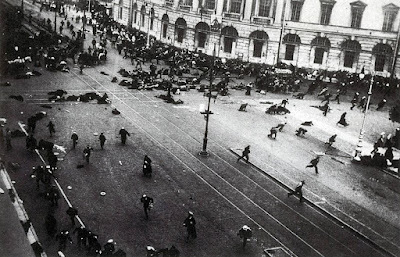
WHAT WAS
'RED OCTOBER'?
G'day folks,
No doubt, you have heard this term before, but what does it signify?
After the February Revolution in 1917 overthrew Russia's centuries-old monarchy, the conflict between the Provisional Government led by Alexander Kerensky and the Bolsheviks led by Vladimir Lenin intensified around the country.
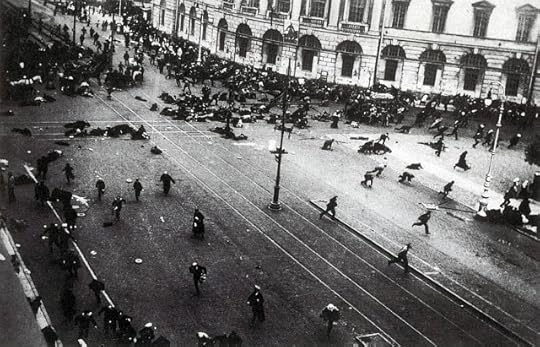
On 7 November (25 October in Old Style) Bolshevik forces under Lenin's command seized government buildings in Petrograd (or St. Petersburg) and the following day the Winter Palace. This began the Soviet rise to power, and on 9 November the Bolsheviks proclaimed the creation of the Russian Socialist Federative Soviet Republic, the first socialist state so created.
The revolution did not end the struggles. Over the next 5 years the country descended into the chaos and anarchy of the Russian Civil War; the Soviets would triumph, leading to the creation of the Soviet Union in 1922.

Clancy's comment: Now you know. My personal experiences in Russia were delightful. That's all I will say.
I'm ...


20 October 2021 - NO WHISTLING ALLOWED IN 'POSH' LONDON SHOPS

NO WHISTLING ALLOWED
IN 'POSH' LONDON SHOPS
G'day folks,
One of London’s poshest shopping streets opened in 1819 – in a move to clamp down on litter louts and “undesirables”.
At the time Lord George Cavendish lived in Burlington House and was fed up with “ruffians” throwing rubbish – in particular, oyster shells – onto his property. He could, Trump-like, have built a wall, but decided on something far more ambitious.
He told his architect, Samuel Ware, to design a covered promenade of shops. This would not only solve the rubbish problem but enable Cavendish to enjoy the kudos of having created a development “for the gratification of the public and to give employment to industrious females”.
And so London’s famous Burlington Arcade was born. Linking Piccadilly with Bond Street in London’s exclusive Mayfair district, it was the world’s first shopping arcade and is now regarded as an architectural treasure.
The walkway was originally lined with 72 small two-storey units but mergers and changes of ownership mean that the opulent arcade now has only 46 shops. None of them are cheap.
Fancy a David Duggan Rolex watch or Manolo Blahnik shoes? They’re here. Or perhaps an exquisite Victorian gold-coiled snake bracelet, studded with rose diamonds and a pear-shaped sapphire from Hancocks the 150-year-old jewellery business? Yours for the asking.
Prices? As the old saying goes, if you need to ask, you can’t afford them.
But if you feel you would not be brave enough to enter a treasure house such as Hancocks, they would understand, knowing as they do, all about courage. During the Crimean War (1853 - 1856) Hancocks were asked to create designs for a new medal – the Victoria Cross. It would be the highest award in the British armed forces for gallantry “in the face of the enemy”. The final design was approved by Queen Victoria and Hancocks have produced every one of the 1,350 VCs that have been awarded.
There being no police force when the arcade opened, Lord Cavendish created his own – the Burlington Arcade Beadles. Recruited from his old regiment, the Royal Hussars, the earliest members included veterans from the Battle of Waterloo.
Charged with upholding a strict code of conduct dating from Regency times and dressed today as they were in 1819, the Beadles still patrol the arcade in traditional top hats and frock coats designed in nearby Savile Row.

Pickpockets posed one of the problems that the early Beadles had to deal with and were sometimes thwarted when the thieves would whistle a warning to accomplices that a Beadle was close. Ever since, whistling has been banned in the arcade.
Today’s Beadles like to tell the story of an encounter in the 1980s when a Beadle was about to politely reprimand a shopper who started to whistle as he was gazing in one of the windows. The shopper turned around and was instantly recognised by the Beadle.
“Oh, Mr McCartney, I'm very sorry,” said the Beadle to the Beatle. “I didn't realise it was you. You are hereby given a lifetime exemption from the rule. You can whistle here any time you like.”
And so, the story goes, Paul McCartney is the only person allowed to whistle in Burlington Arcade.
Lord Cavendish’s former home, Burlington House, was sold to the British Government in 1854 for £140,000. The Royal Academy took over the main block in 1867 on a 999-year lease with rent of £1 per year.
And Burlington Arcade? In 2010 it was purchased for £104 million (130 million US dollars) by American property tycoon Joseph Sitt and European private equity firm Meyer Bergman. In January 2017, they put it back on the market with a price tag of £400 million (502 million US dollars).
Not bad for a development originally built mainly to deter litter louts.

Clancy's comment: Been there. Bought some woollen gloves for my girlfriend. No, I didn't whistle, but I was tempted.
I'm ...


August 30, 2021
1 September 2021 - 'GOTCHA!' - NEW BOOK RELEASE by CLANCY TUCKER
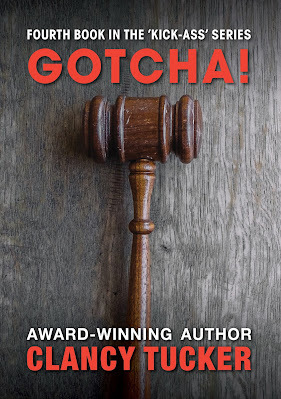
'GOTCHA!
- NEW BOOK RELEASE -
CLANCY TUCKER

G'day folks,
Well, book four in the 'Kick-Ass' series is ready to hit the bookstores. Having said that, I seriously suggest you read the three previous novels before you read this book: 'KICK-ASS' TYLER' & 'BETTER THAN SLICED BREAD', and 'LIFE SUCKS!'. That way, you will follow Sam as she encounters life, and a heap of experiences along the way.

DEDICATION:
This book is dedicated to all those who stepped-up to support those who were facing injustice.

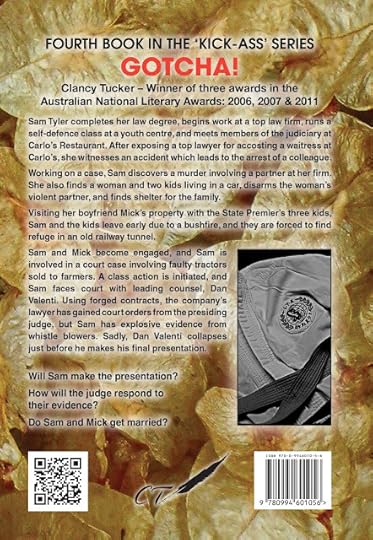
QUOTE FROM THIS BOOK:
Here is a quote from this book when Sam witnesses a waitress being assaulted by a lawyer in a restaurant:
"Then, just as I was about to begin my dessert, I glanced across at the raucous table and noticed Stephanie leaning over their table to deliver a bottle of wine. As she did, the big-mouthed smartass placed a hand under her short skirt. Stephanie immediately pushed his hand away and stepped slightly to the side as she continued to collect plates from the table. The hairs instantly danced on the back of my neck. Furious, I got up and stood beside Stephanie. ‘Steph, I’ll take care of this asshole. Why don’t you take a break,’ I said with a smile ....
I gently kissed Mick’s friendship ring; something I often did when I faced a serious situation.
With her hands laden with plates, Carlo’s daughter left for the kitchen, giving me full access to the guy who’d assaulted her. Fuming, I took a quick gasp of air and leant down to speak directly into the bastard’s ear.
‘Listen, asshole. I have no idea who you are and I don’t really care, but if you touch any of the waitresses again I’ll drag you outside and kick the fucking shit out of you. Have I made myself clear?’ I said, walked slightly to the right and looked directly at his face, wanting to gauge his reaction. The others on his table must have heard some of what I said. They all gaped at me in silence. So far, the offender had said nothing, so I pressed my point. ‘Hey, did you hear what I said, asshole?’'

BLURB:
Sam Tyler completes her law degree, begins work at a top law firm, runs a self-defence class at a youth centre, and meets members of the judiciary at Carlo’s Restaurant. After exposing a top lawyer for accosting a waitress at Carlo’s, she witnesses an accident which leads to the arrest of a colleague.
Working on a case, Sam discovers a murder involving a partner at her firm. She also finds a woman and two kids living in a car, disarms the woman’s violent partner, and finds shelter for the family.
Visiting her boyfriend Mick’s property with the State Premier’s three kids, Sam and the kids leave early due to a bushfire, and they are forced to find refuge in an old railway tunnel.
Sam and Mick become engaged, and Sam is involved in a court case involving faulty tractors sold to farmers. A class action is initiated, and Sam faces court with leading counsel, Dan Valenti. Using forged contracts, the company’s lawyer has gained court orders from the presiding judge, but Sam has explosive evidence from whistle blowers. Sadly, Dan Valenti collapses just before he makes his final presentation.
Will Sam make the presentation? How will the judge respond to their evidence? Do Sam and Mick get married?
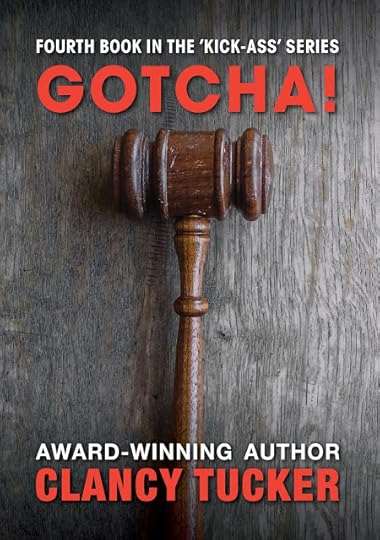
ISSUES RAISED IN THIS NOVEL:
Law, courts, crime, violence, karate, starting work, ethics, principles, integrity, multi-cultural communities, friendships, court cases, racism, politicians, courage, youth, winning, farmers, farming communities, losing, and loyalty.
COMMENTS BY A PROOFREADER:
"I could not put it down. How you write these stories is amazing. Your main character, Sam, is truly inspirational ... so much courage.'
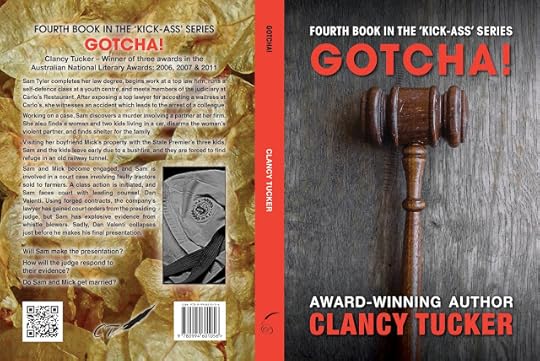


Clancy's comment:
Now, don't be shy. Grab a copy for yourself, your daughter or granddaughter. Oh, this book is not just for females. Young men will find some serious reminders in this book. Trust me, this book will command your attention.

Email me for a copy:
clancy_tucker@hotmail.com
Love ya work, Sam!
I'm ...

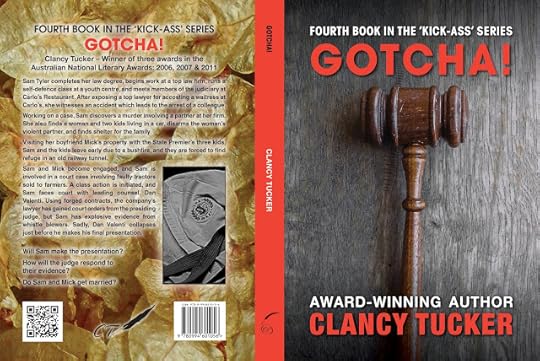
19 October 2021 - WILLIAM SYDNEY PORTER - O. HENRY - 1862-1910
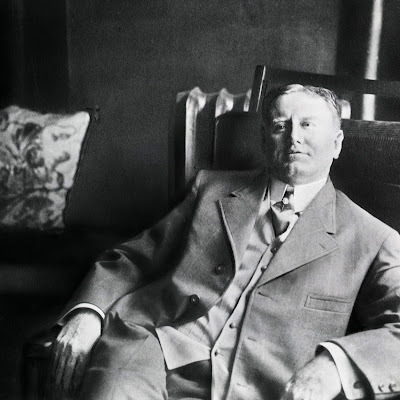
WILLIAM SYDNEY PORTER
- O. HENRY - 1862-1910 -
G'day folks,
Athol Estes Porter died from tuberculosis, then known as consumption, in 1897. The event is significant because her husband, William Sydney Porter, who had been on the run after being charged with embezzlement, was arrested when he returned to be at his wife’s deathbed.
Porter was sent to prison in Columbia, Ohio, for five years and while there produced a body of written work that would help establish him as one of the world’s great short story writers. He wrote them under the pseudonym O. Henry.
He was born in North Carolina in 1862, the son of a medical doctor. Tragically, his mother was to die from tuberculosis when Porter was just three years old – the same disease which, 32 years later, would cause the death of his wife.
When he was 17 he began work in an uncle’s drugstore, and qualified as a pharmacist two years later. But poor health, specifically a persistent cough, made him decide on a move to Texas where he stayed at a friend’s sheep ranch, hoping that a change of air would help his cough.
An avid reader since childhood, Porter dived into classic literature while staying at the ranch. He also worked as a baby-sitter, a shepherd and a cook and learnt a smattering of German and Spanish from the culturally diverse ranch-hands.
His career and his life took a significant turn when he moved to Austin, Texas, in 1884. Porter liked to enjoy himself and became known among Austin’s younger set for his wit, story-telling and musical talents. He not only played guitar and mandolin, but sang in a church choir and became a prominent member of a quartet of young men who sang at social occasions.
One 17-year-old who was captivated by him was Athol Estes and the pair began a romantic attachment, much to the displeasure of Athol’s mother who wanted her daughter to concentrate on improving her health. She, like Porter’s mother before, was suffering from tuberculosis.
As a result of the parental opposition, the pair eloped and were married in 1887. Four years later Porter landed a job as a book-keeper and teller at Austin’s First National Bank, but his career there was cut short when he was accused of embezzlement. The police were not called but he was fired.
If he had hoped that was the end of the matter his hopes were dashed two years later when federal auditors checked the bank’s accounts and discovered missing money. Porter was charged with embezzlement.
On the day before he was due to stand trial he fled, first to New Orleans and then to Honduras. In his writing he described Honduras as a “banana republic” – the first known use of the phrase. He was on the run for a year until he heard that his wife was dying of the same disease that had killed his mother. Porter returned to Austin to be at Athol’s bedside.
He was arrested, found guilty at his trial of embezzling $854 from the bank and sent to prison for five years. It was said that he needed the money partly to pay his wife’s medical bills. She died five months after his return to Austin.
While in prison Porter wrote many short stories including in 1899 "Whistling Dick's Christmas Stocking” – the first to bear the O. Henry pseudonym.
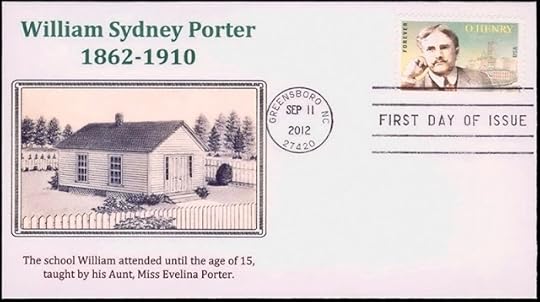
Released after three years for good behavior, he went to live in New York, where his flow of stories began in earnest until, by his death, he had produced more than 600. His stories were distinguished for their witty approach, effects of coincidence on their characters and most often for their surprise endings. His readers loved them.
The world’s other great short story writer, France’s Guy de Maupassant, obviously penned thoughts that were of no appeal to Porter. He said: “I have been called ‘the American De Maupassant.' Well, I never wrote a filthy word in my life, and I don't like to be compared to a filthy writer.”
William Porter had long been a heavy drinker, and he died in June 1910 of cirrhosis of the liver, complications of diabetes, and an enlarged heart, aged just 47.
In 2012, political science professor P.S. Ruckman Jr. and Texas attorney Scott Henson filed a formal application seeking a posthumous pardon for the writer. Previous attempts had been made to obtain such a pardon under Presidents Woodrow Wilson, Dwight Eisenhower and Ronald Reagan. It was never granted.

Cancy's comment: Mm ... an interesting life, but cut short. Hail all short story writers!
I'm ...


August 29, 2021
18 October 2021- THE DAY GENERAL NORIEGA'S WIFE WENT SHOPLIFTING
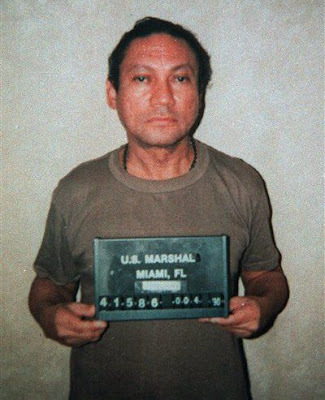
THE DAY GENERAL NORIEGA'S
WIFE WENT SHOPLIFTING
G'day folks,
The exclusive and expensive shop in Miami was called 'Look'. But when Felicidad Noriega, wife of the deposed Panamanian dictator Manuel Noriega, came calling in 1992 she decided to do more than just “look”.
She was arrested after she and a friend were caught snipping buttons from 10 jackets on display at the shop, owned by the Burdines department store chain. Both women were charged with shoplifting $305 worth of buttons.
Police said that Panama`s former First Lady and her friend dropped the buttons into a bag of merchandise that they had genuinely purchased. After passing several cash registers in the store at the Dadeland Mall shopping centre, they left without paying and were arrested outside by the store’s security staff.

Charged with grand theft, the couple spent the night in jail before being released on $1,500 bail each. The police said the women caused $1,242 in damage to the clothes.
Normally, Felicidad would turn to her husband to resolve such a little local difficulty, but he had his own problems. He was nearing the end of his trial for racketeering and drug trafficking, for which he would soon receive a 40-year jail sentence.
In the end, Felicidad’s lawyers signed a deal with the State Attorney’s Office in Miami. The charges against her were reduced to petty theft and criminal mischief and it was agreed no further action would be taken provided she would undertake counselling or community service and pay $1,320 in damages. And that buttoned up the case.

Clancy's comment: Mm ... tell me the company you keep and I'll tell you who you are.
I'm ...


17 October 2021 - FIRST BUS PASSENGERS WERE FRENCH
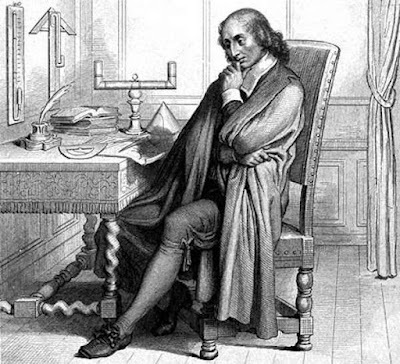
FIRST BUS PASSENGERS
WERE FRENCH
G'day folks,
The first public buses began to run in 1662 – an idea probably 200 years ahead of its time. The service, introduced in Paris, was abandoned in 1675 and public transport did not return to the streets of any major city until 1895.
The idea was promoted by Blaise Pascal who was a man of many talents: physicist, philosopher, mathematician, inventor, author – the list went on. The Governor of Poitou, the Duke of Ronanes, thought it was such a good idea that he decided to back it and had seven horse-drawn carriages built, each capable of carrying eight passengers.
The scheme received royal blessing when King Louis XIV granted the Duke a monopoly, which meant that any competitors would face having their horses and vehicles confiscated.
The scene was set, then, for a grand opening ceremony of the service on 18 March and the Carosses a Cinq Sous, as the buses were called, began work. So a ride in the carriage (carosse) cost five sous, a sou being the least valuable coin in the French currency.
There are conflicting theories concerning the failure of the enterprise. One researcher thought that the service was very well received at first but since people were riding for amusement only, after a few weeks the popularity of the buses waned and the carriages faded into oblivion.
Elsewhere, it was suggested that the new mode of transport was taken up by fashionable members of Parisian society who crowded out the less advantaged citizens. Nobility and gentry were allowed to ride the coaches, but not soldiers and peasants.
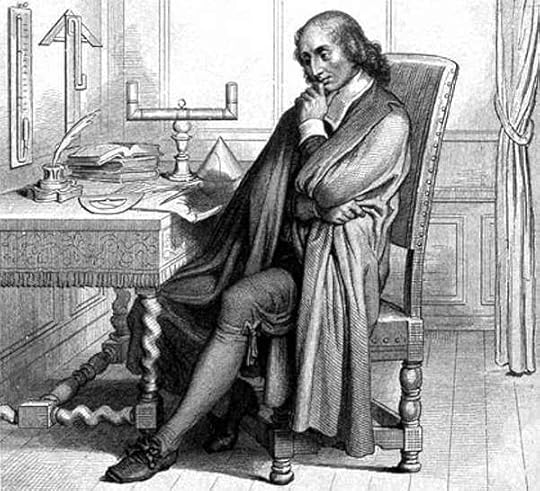 Blaise Pascal
Blaise Pascal
As a result, the poor decided that buses were not for them and when the "trendy set" became bored the service was discontinued.
Pascal is best known today for other achievements: an early calculating machine and work on atmospheric pressure (Pascal's Law).
Wired Magazine reports that he also contributed numerous theorems in geometry and binomial mathematics, laying the groundwork for Fermat, Leibniz and Newton, and inspiring the name of a 20th-century programming language. His letters and philosophical works are still read, studied and admired.

Clancy's comment: There ya go. Busses are now a vital form of transport around the globe.
I'm ...


August 28, 2021
16 October 2021 - SPANISH WORKERS DISCOVER ROMAN COINS
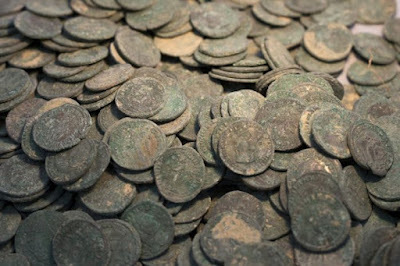
SPANISH WORKERS
DISCOVER ROMAN COINS
G'day folks,
Making a great archaeological find would be one of the most exciting things to happen to anyone. Unearthing a piece of our amazing planet’s past would be enough to fill almost anyone with a sense of joy and accomplishment. Well that’s precisely what happened to these construction workers in Spain. They were going about their day as if it was any other, when all of a sudden they made an absolutely incredible discovery. A discovery so big they couldn’t even unearth the whole thing! Check out what they found below.
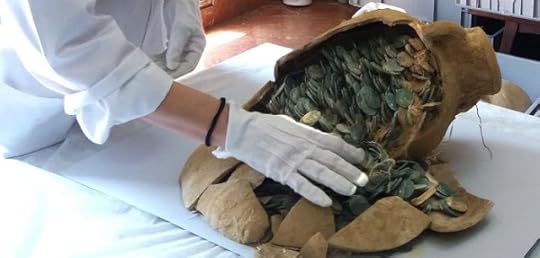


The workers were digging a ditch to run electricity to a park when they came across these old-looking pots. These pots are actually called amphoras, and they were made during the time when Rome ruled much of Europe. There actually turned out to be 19 of these amphoras in the area. All of them were full to the brim with bronze Roman Empire coins.
The coins date back to around the 3rd or 4th century A.D. The surprising thing is that researchers say that these coins were never in actual circulation. The coins feature emperors Maximian and Constantine and are worth at least several million euros!
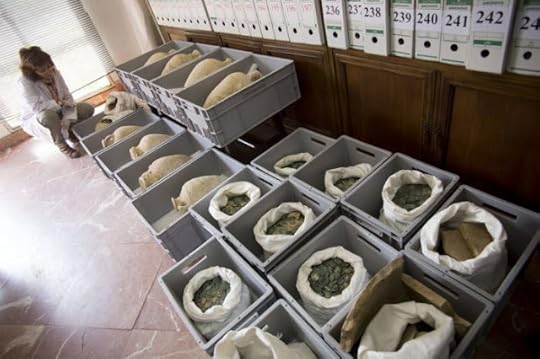



 Clancy's comment: Wow, what a find, eh?
Clancy's comment: Wow, what a find, eh?I'm ...


29 August 2021 - CHARLES DICKENS HAD 10 KIDS
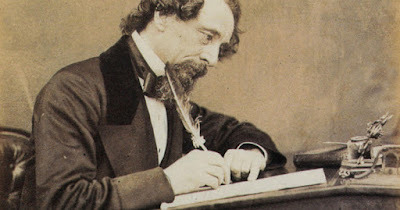
CHARLES DICKENS
HAD 10 KIDS
G'day folks,
Charles Dickens and his wife Catherine had ten children – an expensive number that the author apparently resented, having said privately that he wanted to stop at four.
Before he became famous and rich Dickens certainly found that supporting ten children was a challenge to his income. Astonishingly, he blamed his wife – who herself had come from a large family – for the predicament.
He also, it seems, was disappointed that none of his children appeared to possess the drive and determination that had been a feature of his own life, lamenting that he had “brought up the largest family ever known with the smallest disposition to do anything for themselves.”
This is not to say Dickens did not love them. On that fatal day of April 14, 1851, his oldest daughter Mary recorded that her father had spent much of his time "playing with the children and carrying little Dora about the house and garden.”
Dora Annie Dickens was two days short of being eight months old. She was born at the time her father was writing David Copperfield and he gave her the same name as the child-bride of the book’s main character.
Some time after Dora’s birth her mother suffered a psychological breakdown and Dickens sent her to the countryside – Malvern in Worcestershire – to help her recover.
He visited her there frequently and did so on that terrible day of April 14. Dickens returned to London from Malvern because he was due to give a speech at the annual dinner of the General Theatrical Fund.
He was accompanied to the dinner by his friend, the biographer and critic John Forster. In his book, The Life of Charles Dickens (1871), Forster tells how he informed the author of his daughter’s death:
"Half an hour before [Dickens] rose to speak I had been called out of the room by one of the servants from Devonshire-terrace [the author’s London home] to tell me his child Dora was suddenly dead. She had not been strong from her birth; but there was just at this time no cause for special fear, when unexpected convulsions came, and the frail little life passed away.
“My decision had to be formed at once; and I satisfied myself that it would be best to permit his part of the proceedings to close before the truth was told to him. But as he went on . . . to speak of actors having to come from scenes of sickness, of suffering, aye, even of death itself, to play their parts before us, my part was very difficult.”
In a book of reminiscences about her father Mary wrote: "I remember what a change seemed to have come over my dear father's face when we saw him again . . . how pale and sad it looked.”
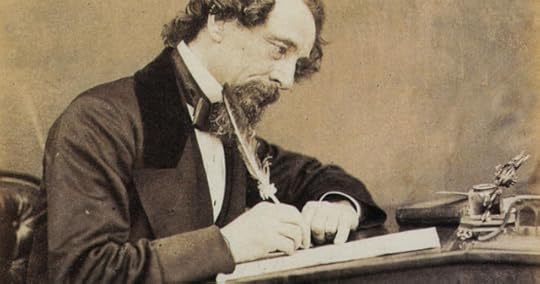
The next task for Dickens was to pass on the awful news to his recuperating wife Catherine. Fearing how she would be affected, he decided not to speak of death but to say that Dora was “very ill.” He wrote:
My Dearest Kate,
Now observe, you must read this letter very slowly and carefully. If you have hurried on thus far without quite understanding (apprehending some bad news) I rely on your turning back and read again.
Little Dora, without being in the least pain, is suddenly stricken ill. She awoke out of a sleep, and was seen in one moment to be very ill. Mind! I will not deceive you. I think her "very" ill.
There is nothing in her appearance but perfect rest. You would suppose her quietly asleep. But I am sure she is very ill, and I cannot encourage myself with much hope of her recovery. I do not – and why should I say I do to you, my dear? – I do not think her recovery at all likely.
. . . You will not like to be away, I know, and I cannot reconcile it to myself to keep you away. Forster, with his usual affection for us, comes down to bring you this letter and to bring you home, but I cannot close it without putting the strongest entreaty and injunction upon you to come with perfect composure — to remember what I have often told you, that we never can expect to be exempt, as to our many children, from the afflictions of other parents, and that if, – if – when you come, I should even have to say to you, "Our little baby is dead," you are to do your duty to the rest, and to shew yourself worthy of the great trust you hold in them.
If you will read this steadily I have a perfect confidence in your doing what is right.
Ever affectionately, Charles Dickens
Dora was interred in a tomb at London’s Highgate Cemetery where she would be joined by her mother when she died 28 years later.

Clancy's comment: Ten! My grandparents had nine ... lucky me, eh?
I'm ...

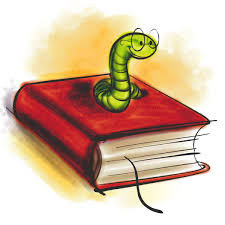
August 26, 2021
27 August 2021 - TOP BOOK REVIEW FOR CLANCY TUCKER'S NOVEL - 'LIFE SUCKS!'

TOP BOOK REVIEW FOR
CLANCY TUCKER'S NOVEL
- 'LIFE SUCKS!' -
G'day folks,
Over the years as an author, I've met some great people, many of whom are book reviewers. One of Australia's best book reviewers is Anastasia Gonis, and she has once again provided a wonderful review for my latest book - Life Sucks! Anastasia works freely and generously for a site called KIDS' BOOK REVIEW.
This book is the third book in the Kick-Ass series, a series about an amazing young woman named Sam Tyler. The previous books in the series are: 'Sam ''Kick-Ass' Tyler' & 'Better Than Sliced Bread'. This series covers the life and times of Sam as she overcomes many obstacles and challenges in life, including being kidnapped, surviving cancer, entering university to study law, and various deaths of close friends along the way.
Oh, the next book in this series is about to be released. It's called 'Gotcha!' The book after that is almost ready to go to print, 'Team Skippy', but brace yourself when you read that book. It's powerful.
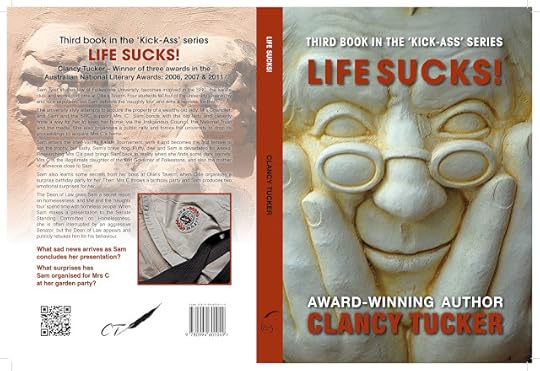

REVIEW
Life Sucks! is Clancy Tucker’s third book in the ‘Kick Ass’ series featuring the bold, intelligent and proactive, Sam Tyler.
She is a dynamic character; a fighter for lost causes who believes in giving everyone a fair go. Many important issues are addressed through her thoughts and dialogue.
After beating brain cancer, Sam is now a Law student on a scholarship at Folkestone University. She immediately becomes involved in the Student Council, continues her karate at which she excels, and gets a part-time job at Ollie’s Tavern near the campus.
She is eager, willing and able to be the best she can be in every area of her life.
Past hardships have taught her to be compassionate and grateful, and ready to serve where she is needed. Just like her dad who died when she was twelve.
Sam meets the wealthy Mrs Chandler who owns a mansion close to the University. She is the now elderly daughter of the first Governor of Folkestone. Mrs C is impressed by Sam’s honesty and forthright manner. It doesn’t take long before they spark up a warm friendship.
When Sam learns that the University is working in an insidious manner to take Mrs C’s home from her, Sam’s determined to stop them. Research on the manor uncovers many important facts; about the people on the board as well as the historical and Indigenous significance of the land. This is the first uncovering of a cluster of unknowns.
Then Sam learns that her dad and Ollie from the tavern were mates during the Vietnam War. At last, there is someone who can give her information about her dad’s war life!
There is more than Law for Sam to learn at Folkestone.
Mrs C has secrets she won’t share with anyone. Sam’s roommate and three friends, who refuse to buckle down and study, are facing expulsion. There is the matter of homelessness that tugs at Sam’s heart. Her ability to show kindness and understanding is her greatest weapon against things that need changing. Then there is the Varsity Karate Tournament. It has never been won by Folkestone. Can she be the first to bring home the trophy?
Challenges are what Sam thrives on. But sometimes, life sucks!
Always with positive and inspiring messages, award-winning Clancy Tucker’s writing is spellbinding. A Human Rights Activist among a string of other things, his work with street kids puts him in a perfect position to write about young people authentically, passionately championing those in need. Issues that are close to his heart always surface in his books, with his leading characters their conduit.
Life Sucks! is another terrific, no-holds-barred look at society’s shortcomings, and the scandalous manipulation and abuse of power that occurs within the political ranks. More so, it explores the secrets people keep, the importance of acts of kindness, and giving everyone a second chance, regardless of their mistakes or shortcomings.
ALL OF MY BOOKS ARE AVAILABLE AS PAPERBACKS AND E-BOOKS. TO BUY A COPY EMAIL ME AT:
clancy_tucker@hotmail.com

Clancy's comment: Forever grateful for your reviews, Anastasia.
Love ya work!
I'm ...

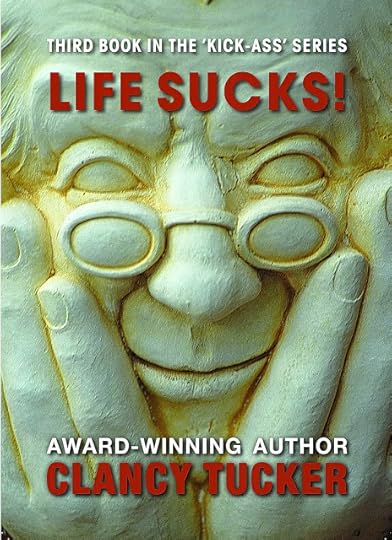
August 25, 2021
15 October 2021 - SINATRA PHOTOGRAPHS FIGHT OF THE CENTURY

SINATRA PHOTOGRAPHS
FIGHT OF THE CENTURY
G'day folks,
It was billed as “the Fight of the Century”.
Muhammad Ali, who had been stripped of his World Heavyweight Championship and suspended from boxing for three years after refusing to serve in the Vietnam war, took on Joe Frazier, the man who had taken his title, at Madison Square Garden in New York.
Both fighters were undefeated and the contest was broadcast live to an international television audience. It was also attended by a galaxy of stars including Woody Allen, Diana Ross, Dustin Hoffman, Burt Lancaster, Barbra Streisand, Sammy Davis Jr, Hugh Hefner, author Norman Mailer and – doing it his way – Frank Sinatra.
Sinatra, who listed photography as a lifelong hobby, had secured a deal (and with it a much sought-after ringside seat) with Life magazine to take pictures of the fight. How he achieved this is uncertain. It was rumoured that even with his connections and influence he was unable to secure a place in the front row. So he approached Ralph Graves, the managing editor of Life, to work for the magazine as a guest photographer.
Graves insisted later: “Sinatra was always going to be at the fight and was always planning on bringing a camera with him. For our pictures of the action, we were relying on the magazine pool photographers at ringside. But it never hurts to have a horseshoe in your glove.”
Four of Sinatra’s pictures, including the front cover shot, were used by Life to illustrate the story of the fight, written by Norman Mailer.
But not to everyone’s approval. Robert Kelley, a former Life staff photographer, wrote a scathing letter to the magazine, saying: “Sirs: I'm so mad I could chew nails and spit tacks. I've been a professional news photographer 34 years (about 18 on Life’s staff) and what irks me is your cover. It was obviously selected because Frank Sinatra took it, rather than for any photographic excellence. In fact, it was a bad picture. What millions of Life readers wanted to see was Frazier's fist firmly implanted against Muhammad Ali's mouth.”
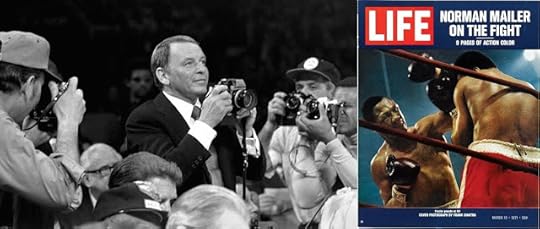
Sinatra said later: "I got some good pictures, but I kept watching Frazier putting his head too far out for Ali to punch it. He was defying Ali, and I said to the newspaper guy next to me: 'He may win, but if he keeps that up, he's going to the hospital, taking all those punches.'”
He was right. Frazier did win but had to receive hospital treatment over the following month suffering from hypertension and kidney problems. Ali was also taken to hospital straight after the fight for treatment on his badly swollen jaw.

Clancy's comment: Ah, back in the day!
I'm ...





